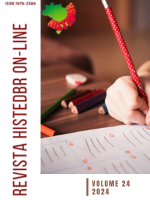Abstract
Pierre Bourdieu has undoubtedly made an important contribution to educational theory. Despite its acute analysis, the educational system seems to resist seeing the importance of these, becoming visible, at present, that the objects of study that it addressed are still valid. For this reason, this text aims to establish relationships between some of the main notions proposed by him, to highlight the relevance of his legacy to the educational field; a field that increasingly shows more inequality. From a critical and up-to-date perspective, this paper intends to present, in a synthetic but acute way, some of the relationships that Bourdieu finds between his ontological conception of the social, and the educational system and process, in particular from understanding his perspective. about the school, that is, as an institution that generates a certain symbolic violence and the implication that it has in the reproduction of certain class differences that are manifested in the social heart. Treatment that, for the purposes of this approach, will focus on some approaches of those who subscribe to this text from taking categories such as: pedagogical discourse, naturalism or charismatic ideology and democratization of education as conceptual nuclei.
References
ARENDT, H. La condición humana. 1ra ed., 5ta reimp. Bunos Aires: Paidós, 2009.
ASTETE, C. Pierre Bourdieu: el poder en el campo de la educación y la pedagogía. Horizonte de la Ciencia, v. 7, n. 12, p. 223-239, 2017. Universidad Nacional del Centro del Perú. DOI: https://doi.org/10.26490/uncp.horizonteciencia.2017.12.323. Disponible en: https://revistas.uncp.edu.pe/index.php/horizontedelaciencia/article/view/323. Acceder: 20 fev. 2022
BOURDIEU, P. ¿Qué significa hablar? Economía de los intercambios lingüísticos. 1. ed. Ciudad Autónoma de Buenos Aires: Ediciones Akal, 2014.
BOURDIEU, P. Capital cultural, escuela y espacio social. Buenos Aires: Siglo XXI 2008.
BOURDIEU, P. Cosas dichas. Barcelona: GEDISA, 2000.
BOURDIEU, P. La Distinción. Criterio y bases sociales del gusto. Trad. M del C Ruiz. Madrid: Taurus, 1991.
BOURDIEU, P. Las estrategias de la reproducción social. Buenos Aires: Siglo XXI, 2011.
BOURDIEU, P.; PASSERON, J. C. La reproducción. Elementos para una teoría del sistema de enseñanza. Primera edición en español. Barcelona: Laia, 1996.
BOURDIEU, P.; PASSERON, J. C. Los herederos: los estudiantes y la cultura. 1° edición, 2° reimpresión. Buenos Aires, Siglo XXI, 2006.
BUENFIL BURGOS, R. Análisis de discurso y educación. Publicado por el Departamento de Investigaciones Educativas Centro de Investigación y de Estudios Avanzados del Instituto Politécnico Nacional. México: DIE 26, 1992.
CANGUILHEM, G. El cerebro y el pensamiento. Conferencia en la Sorbonne para el M.U.R.S. (diciembre de 1980); primera publicación en Prospective et Santé, N° 14. 1980.
CRISORIO, R.; ESCUDERO, C. (coord.). Educación del cuerpo: curriculum, sujeto y saber. La Plata. Universidad Nacional de La Plata, Facultad de Humanidades y Ciencias de la Educación, 2017. (Cuerpo, Educación y Sociedad; 1). Disponible en: http://www.libros.fahce.unlp.edu.ar/index.php/libros/catalog/book/82. Acceder: 22 fev. 2017.
DOGLIOTTI, P. La Educación Física: ¿De qué cuerpo hablamos? In: BEHARES, L. E.; RODRÍGUEZ GIMÉNEZ, R. Cuerpo, lenguaje y enseñanza. Montevideo, UY: Departamento de Publicaciones de la Facultad de Humanidades y Ciencias de la Educación, 2008. ISBN: 978-9974-0-0460-3.
FOUCAULT, M. El orden del discurso. Primera edición. Madrid: La Piqueta, 1996.
FOUCAULT, M. Saber y verdad. Madrid: Las Ediciones de La Piqueta, 1991.
FOUCAULT, M. Vigilar y castigar. Bs. As.: Siglo XXI, 1989.
MEIRIEU, P. Frankenstein Educador. Barcelona: Laertes. 1998.
MERLIN, N. “Colonización de la subjetividad: las neurociencias”. La Tecl@ Eñe. Revista de Cultura y Política, Buenos Aires, 2017. Disponible en: http://www.lateclaene.com/nora-merlin-cil9. Acceder: 23 mar. 2017.
MOLINA GALARZA, M. La sociología del sistema de enseñanza de Bourdieu: reflexiones desde América Latina. Cadernos de Pesquisa, v. 46, n. 162, p. 942-964, out./dez. 2016. Disponible en: https://www.scielo.br/j/cp/a/pGcf8jwCRTFV37XLG6fjKKH/?format=pdf&lang=es. Acceder: 19 fev. 2022.
RANCIÈRE, J. El maestro ignorante. Cinco lecciones para la emancipación intelectual. Buenos Aires: Libros del Zorzal, 2017. ISBN 978-987-599-054-8.
RODRÍGUEZ GIMÉNEZ, R. Conocimiento, escolaridad y políticas del cuerpo. In: BEHARES, L.; RODRÍGUEZ GIMÉNEZ, R. Cuerpo, Lenguaje y Enseñanza. Uruguay: Departamento de publicaciones de la Facultad de Humanidades y Ciencias de la Educación, Montevideo, 2008. ISBN: 978-9974-0-0460-3.

This work is licensed under a Creative Commons Attribution-NonCommercial 4.0 International License.
Copyright (c) 2024 Germán Hours; Eliana Lescano


